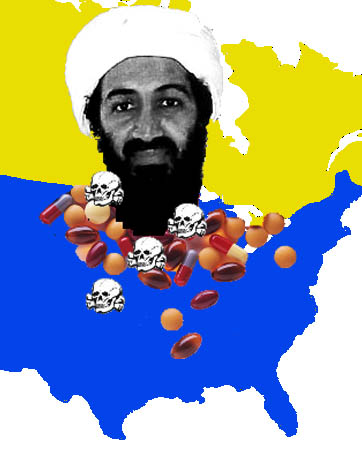Dear Reader,
Welcome to the September 2004 archive of Pharma Marketing News.
- Vol. 3, No. 8: September 2004 – CONTENTS
Drug Importation Crisis: Terror Politics to the Rescue!
Opinion by John Mack

Crawford’s remarks may strike some as politically motivated and Brian Roehrkasse, spokesman for the Homeland Security Department responded to Crawford’s remarks by saying “While we must assume that such a threat exists generally, we have no specific information now about any al-Qaida threats to our food or drug supply.”
FDA also claims that drugs from Canada may be unsafe because they may be counterfeit, cheap foreign copies of FDA-approved drugs, expired, contaminated or stored under inappropriate and un-safe conditions. These arguments have some merit and point out we have a lot more to fear from unscrupulous profiteers than from terrorists when it comes to the safety of our drug supplies.
Reimportation is a growing and real concern for the pharmaceutical industry-in 2002, the American people imported about $1.1 Billion worth of drugs from Canada. To add to the industry’s woes, Congress is considering several bills that seek to make drug importation from Canada legal. There is a chance that one of these bills will be passed, if not in this session of Congress, then perhaps the next (see article, “Congress Fiddles While Reimportation Issue Burns”).
Let’s not try to win every policy argument by bringing terrorism into the equation. I think it undermines our vigilance against real terror threats. Remember the moral of Aesop’s fable about the little shepherd boy: There is no believing a liar, even when he speaks the truth.
IMHO,

![]()
John Mack, Publisher and Editor
editor@pharmamarketingnews.com
Article Summaries
The Indian Pharmaceutical Market
By Todd Clark
The Indian pharmaceutical market is the world’s fourth largest by volume (8% of global total) and thirteenth largest by value (less than 1% of global total). Although prices are the lowest in the world, 70% of the population does not have access to drug therapy and 2002 per capita consumption was only $3.33. The lack of pharmaceutical patents means that there is an average of 200 brands for every molecule on the market.
This except from the PharmaHandbook 2004 Edition covers the following topics:
- Patent Protection
- R&D / Clinical Trials
- Generics
- Marketing
More…
![]() Read the full text of this article (includes tables; PDF format).
Read the full text of this article (includes tables; PDF format).
Congress Fiddles While Reimportation Issue Burns
By John Mack
Several drug re-importation bills are currently being considered in Congress.
Two Senate bills, the Pharmaceutical Market Access and Drug Safety Act of 2004 (S.2328) and the Safe IMPORT Act of 2004 (S.2493), are likely to meet head-to-head in conference committee. While neither may make it out alive in this session of Congress, the issue of re-importation, however, is not likely to go away.
This article offers a useful comparison of the provisions of these bills and illustrates where the lines on the policy debate are being drawn.
Topic headings:
- The Senate Contenders
- Comparing Provisions
- Pharma’s Position
- Table: Drug Importation Bills in Congress
- Chart: Pharmaceutical Expenditures as Percent of Total health Expenditure (Canada v.s US)
More…
Order the Full Article Reprint – $9.95
How Cheap are Canada’s Drugs Really?
By Aidan Hollis
This article compares pharmaceutical prices paid by governments in the United States and Canada. The comparator prices are those of the Federal Supply Schedule and the Ontario Drug Benefit List, for frequently prescribed brand name medicines.
The price differential between Canadian and US prices is shown to be relatively small, when considering prices charged to governments.
Buyer power exercised by governments is very important in reducing pharmaceutical prices and comparisons between retail prices in the US and government prices in Canada are therefore inappropriate.
More…
![]() Read the full text of this article (includes price table; PDF format).
Read the full text of this article (includes price table; PDF format).
Becoming Woman Wise: Marketing Healthcare to Women
By Michael Bramwell
“In 92% of households, women are the number one decision makers for most if not all purchases,” said Daria Blackwell, President and CEO, Knowledge Clinic, Inc. She was speaking at the Women’s Health and Wellness Conference held July 15-16 in Iselin, New Jersey. “More than 80% of healthcare purchasing decisions are made by women. Women account for more than half of the population in the United States and it makes absolute sense to market to women where, when, and how they choose,” she continued.
This article summarizes Ms. Blackwell’s presenation and includes eight strategic approaches to women’s health marketing.
Topic headings:
- Women vs. Men vs. Other Women
- Audience Segmentation
- Give Women What They Want
More…
Order the Full Article Reprint – $9.95
Accelerating Your Multicultural Communications
By Michael Bramwell
Multicultural communications can be a powerful addition to the armamentarium of the healthcare marketer. Often the most “successful” campaigns do not reach as wide an audience as possible because of a failure to understand either cultural or linguistic gaps when communicating with ethnic audiences. These people are a fast-growing segment of the population in the United States, and particularly in the area of health, they face huge disparities that call for proactive, aggressive, and ongoing multicultural healthcare commun-ications campaigns.
Why address multicultural communications? “From a business standpoint, it just makes sense. When 30 percent of your audience is ethnic, it no longer becomes a risk to address this audience, but a priority,” said Walter Arenzon, President and Creative Director, Farmacopea, Inc. He was speaking at the Women’s Health and Wellness Conference held in Iselin, New Jersey, July 15-16.
Topic headings:
- Sex, Drugs, and Salsa Music
- Effective Multicultural Communications
- Talk to Ethnic Women
More…
Order the Full Article Reprint – $9.95



![6 Digital Tools at the Center of Healthcare Digitalization [INFOGRAPHIC]](http://ec2-54-175-84-28.compute-1.amazonaws.com/pharma-mkting.com/wp-content/uploads/2021/04/6DigitalTools_600px-218x150.jpg)




![6 Digital Tools at the Center of Healthcare Digitalization [INFOGRAPHIC]](http://ec2-54-175-84-28.compute-1.amazonaws.com/pharma-mkting.com/wp-content/uploads/2021/04/6DigitalTools_600px-100x70.jpg)




